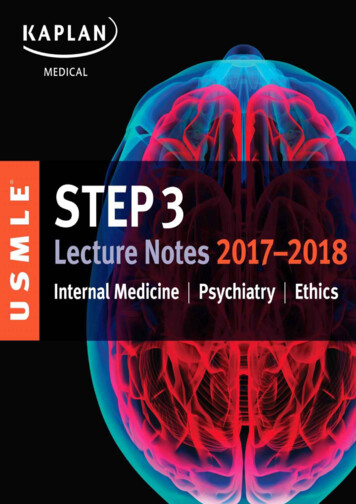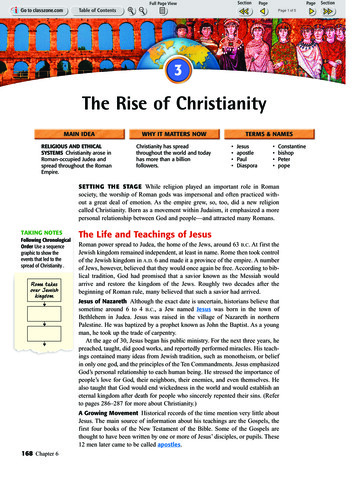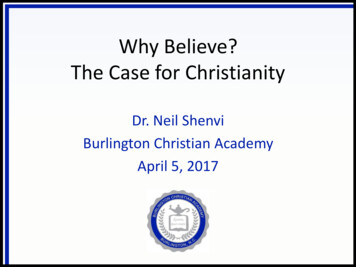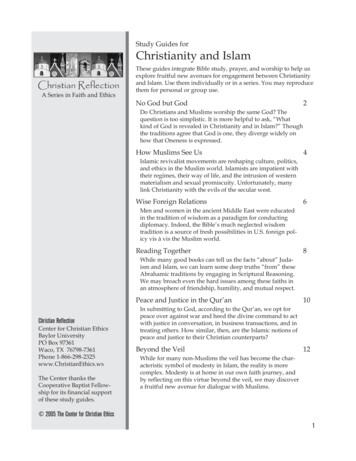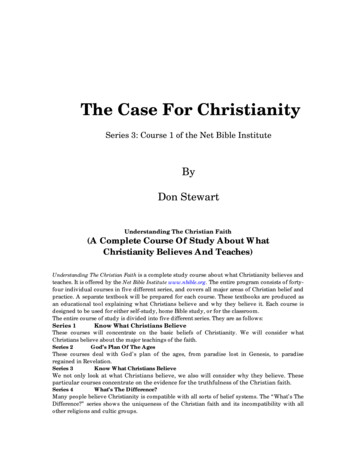
Transcription
The Case For ChristianitySeries 3: Course 1 of the Net Bible InstituteByDon StewartUnderstanding The Christian Faith(A Complete Course Of Study About WhatChristianity Believes And Teaches)Understanding The Christian Faith is a complete study course about what Christianity believes andteaches. It is offered by the Net Bible Institute www.nbible.org. The entire program consists of fortyfour individual courses in five different series, and covers all major areas of Christian belief andpractice. A separate textbook will be prepared for each course. These textbooks are produced asan educational tool explaining what Christians believe and why they believe it. Each course isdesigned to be used for either self-study, home Bible study, or for the classroom.The entire course of study is divided into five different series. They are as follows:Series 1Know What Christians BelieveThese courses will concentrate on the basic beliefs of Christianity. We will consider whatChristians believe about the major teachings of the faith.Series 2God’s Plan Of The AgesThese courses deal with God’s plan of the ages, from paradise lost in Genesis, to paradiseregained in Revelation.Series 3Know What Christians BelieveWe not only look at what Christians believe, we also will consider why they believe. Theseparticular courses concentrate on the evidence for the truthfulness of the Christian faith.Series 4What’s The Difference?Many people believe Christianity is compatible with all sorts of belief systems. The “What’s TheDifference?” series shows the uniqueness of the Christian faith and its incompatibility with allother religions and cultic groups.
Answering Bible DifficultiesSeries 5This comprehensive series will be a thorough examination of all major Bible difficulties beginning in the Book of Genesis and going right on through the Book of Revelation.A complete list of all the courses offered in this study series can be found at the end of the book.Why Study The Christian Faith?Why should anyone study the Christian faith? What are the reasons why someone should spendtime reading and studying the Bible?Learn About JesusWhen Jesus was here on the earth He commanded His disciples to learn about Him.Come to Me, all you that are weary and are carrying heavy burdens, and I will give you rest.Take My yoke upon you, and learn from Me; for I am gentle and humble in heart, and youwill find rest for your souls. For My yoke is easy, and My burden is light (Matthew 11:2830).His invitation to come and learn from Him is still valid today.Practiced From The BeginningFurthermore, regular study about God and His Word was something believers practiced from thebeginning. The Christian church began on the Day of Pentecost when 3,000 people placed theirfaith in Jesus. Immediately they began learning about their new-found faith. The Bible says thefollowing about these new converts:They devoted themselves to the apostles’ teaching and fellowship, to the breaking ofbread and the prayers (Acts 2:42).Devote OurselvesThere was a central core of beliefs that the Scripture calls the “apostles’ teaching.” This is whatthe believers devoted themselves to learning. The devotion of the early church to the study ofGod’s Word is a model for all believers. Those who believe in Jesus are commanded to followtheir example.Do your best to present yourself to God as one approved by Him, a worker who has noneed to be ashamed, rightly explaining the Word of truth (2 Timothy 2:15).Faith Has Been DeliveredThe Bible says that these truths have been once-and-for-all delivered to the saints:Beloved, while eagerly preparing to write to you about the salvation we share, I find itnecessary to write and appeal to you to contend for the faith that was once for allentrusted to the saints (Jude 3).In Systematic FashionThough God has revealed a core of teachings to humanity, He did not lay them out in asystematic way. Rather He placed them in His Word in such a way that we are to search them outfor ourselves. There is great reward when the Bible student explores God’s Word to seek out thetruth of His character and His plan for humanity.The Bible commands believers to practice the things that are learned.Pay close attention to yourself and to your teaching; continue in these things, for indoing this you will save both yourself and your hearers (1 Timothy 4:16).A Sign Of The End - Rejection Of The FaithIn addition, serious Bible study can keep people from being deceived. The Bible says that one ofthe signs of the last times is the renouncing of the faith by many.Now the Spirit expressly says that in later times some will renounce the faith by payingattention to deceitful spirits and teachings of demons (1 Timothy 4:1).Careful study of the Bible will keep a person from believing in false teaching.Many Reasons To StudyThe study of the Christian faith is something of immense importance. Those who place their faithin Jesus are to learn about Him and practice the things they learn. The Bible says that God hasonce-and-for-all revealed a central core of truths to humanity. The believers in the early church
devoted themselves to studying these great truths. Scripture commands all believers to do thesame. By doing so, a person can live a full life that is well-pleasing to God. In addition, studyingthe Bible will keep one from falling into false doctrine.A MustBecause of these reasons, serious study of the Bible is a must for those who have believed inJesus. We trust that our series of courses will aid the student in their understanding of God’sWord. It is with this thought in mind that we offer “Understanding The Christian Faith.”
Table Of ContentsIntroductionPart 1 Apologetics: The Defense Of The Christian FaithThe Case For ChristianityPart 2 Introducing The Case For ChristianityPart 3 The Reliability Of The New TestamentPart 4 The Historical Accuracy Of The New TestamentPart 5 The Claims About ChristPart 6 The Deity Of ChristPart 7 The Claims Of Christ ConsideredPart 8 MiraclesPart 9 Predictive ProphecyPart 10 The Resurrection Of Jesus ChristPart 11 Jesus’ View Of The Old TestamentPart 12 Jesus’ View Of His Own TeachingsPart 13 Jesus’ View Of The New TestamentPart 14 Summary And ConclusionA Complete List Of CoursesAbout The Author
Introduction To The Case For ChristianityCan an intelligent person embrace the Christian faith? Is it possible for someone to use theirintellect and be a Christian at the same time? This course is designed to answer these, as well asother questions, with respect to the truthfulness of the claims of Jesus Christ.We have titled our course The Case For Christianity. In our study we will examine the evidence forthe Christian faith to see if it stands up to close scrutiny.Importance Of The IssueThe importance of the issue cannot be overstated. If Christianity is true, then all other religioussystems are mere pretenders. They are a hindrance to the truth of God and should be ignored.Jesus made this clear:I am the door; if anyone enters through Me, he shall be saved, and shall go in and out,and find pasture. The thief comes only to steal, and kill, and destroy; I came that theymight have life, and might have it abundantly (John 10:9,10).Later He said:I am the way, the truth, and the life, no one comes to the Father except through Me(John 14:6).Two Simple ChoicesSince Jesus claimed that He is the only way for a person to reach the Living God, the choices aresimple: Either the Christian faith is a monumental fraud and should be rejected, or it is therevelation of the one true God who exists. There is no middle ground.Christianity Deserves A Fair HearingBecause of the importance of the issue, and the clear choices we face, the case for Christianityshould be given a fair hearing - the evidence should have a chance to speak for itself. This studylays out some of that evidence.Intelligent FaithThe Christian faith does not claim to be able to prove everything that it believes but there isenough evidence to demonstrate that faith in Jesus Christ is reasonable. Becoming a believer doesmean that a person exercises faith, but it is not blind faith. It is, rather, reasonable and intelligentfaith based upon compelling evidence.It is our belief that when one honestly considers the facts about Jesus Christ and Christianity itwill become obvious that a person does not have to assassinate their brain to be a Christian.With these thoughts in mind let us now consider The Case For Christianity. . .
Part 1Apologetics:The Defense Of The Christian Faith
Apologetics: The Defense Of The Christian FaithThe Central Issue: Humans Have Many Belief OptionsAs we begin our examination of the claims of the Christian faith we must first look at the need tomake such a inquiry. Why should anyone investigate the evidence to see whether or notChristianity is true? The answer to this question can be simply stated: There are a variety ofchoices that we, as human beings, have with respect to the existence or non-existence of God orgods. Christianity is only one of these many options. In addition, the Christian faith makes someunique claims about itself. For these reasons, it must be carefully examined along with the otherbelief options of humanity.A. The ChoicesHumanity has the following choices when it comes to believing in the existence or non-existenceof God or gods:1. AGNOSTICISMAgnosticism says, “I do not know if God or gods exist.” Some agnostics believe that it is notpossible to know if a divine “being” or “beings” exist. Their view is that one cannot knowanything about these matters. On the other hand, there are those agnostics who think thatknowledge about God is possible, yet they are not convinced that there is enough evidence toprove the case. Whatever the exact position may be, an agnostic claims no knowledge, one way orthe other, about the existence of God.2. ATHEISM OR THEISMContrary to agnosticism, which says it does not know, are theism and atheism. Both of thesegroups claim to have knowledge about the existence of a supernatural being or beings. Theatheist knows that God or gods do not exist. The theist knows that God or gods do exist.3. Polytheism Or Monotheism (One God Or Many?)Those who believe in the existence of God must decide whether they believe in polytheism or inmonotheism. Polytheism believes in the existence of many gods, though a polytheist may chooseto worship only one of these gods (this is known as henotheism). A monotheist believes only oneGod exists - no other so-called gods have any real substance.4. PANTHEISM OR A PERSONAL BEINGIf only one God exists, then it must be determined whether that one God is a personal orimpersonal being. Pantheism (God is equal to everything) believes that the one God who exists isimpersonal - he has no personal existence apart from creation. Creation and God are one-in-thesame. Those who believe in a personal God make a distinction between God and His creation God exists separately from that which He created.5. DEISM OR A PERSONALLY INVOLVED GODIf only one God exists, and that one God is a personal God, then our next question considers Hisinvolvement in our world. Is the one God intimately involved in the affairs of humanity? Deismsays that God is not involved with humanity. God started everything in the beginning and thenbacked off from His creation. He is no more than an onlooker. This is opposed to a God who ispersonally involved in the lives of the beings He created (such as the God revealed in the Bible).6. UNITARIANISM VERSUS TRINITARIANISMWe now come to our final option. If there is one personal God who exists, and He is intimatelyinvolved in the affairs of humanity, is this God a unity or a Trinity? Is there only one person, orare there a plurality of persons within the nature of the one God?These are the various belief options that humans have. Each human being will fit into one ofthese categories with respect to his or her belief about the existence or non-existence of God orgods.
With so many belief options that are possible, certain questions naturally arise for the Christian:Why believe in Jesus? What makes Christianity different than these other possibilities? It is,therefore, the responsibility of the Christian to respond to these type of questions.B. The Christian ResponseThe job of defending the Christian faith, and answering questions such as these, is known asapologetics. One person has defined apologetics as “proving what you never doubted byarguments you don’t understand.” This, however, is certainly not the case!Our English word “apologetics” comes from two Greek words - the noun apologia and the verbapologeomai. In the New Testament era, these words meant “to give a defense or reply.” They arefound some eighteen times in the New Testament.The Noun “Defend”The noun apologia is used eight times in the New Testament.1. Brothers and fathers, hear my defense which I now offer to you (Acts 22:1).The Apostle Paul is offering a defense to certain things he was wrongly accused of.2. And I answered them that it is not the custom of the Romans to hand over any man beforethe accused meets his accusers face to face, and has an opportunity to make his defenseagainst the charges (Acts 25:16).Here the word is used in the technical sense of making a defense against accusers.3. My defense to those who examine me is this (1 Corinthians 9:3).Paul again is using the term in the legal sense.4. For behold what earnestness this very thing, this godly sorrow, has produced in you: whatvindication of yourselves, what indignation, what fear, what longing, what zeal, whatavenging of wrong! In everything you demonstrated yourselves to be innocent in the matter(2 Corinthians 7:11).Here the word has the idea of vindication.5. For it is only right for me to feel this way about you all, because I have you in my heart,since both in my imprisonment and in the defense and confirmation of the gospel, you allare partakers of grace with me (Philippians 1:7).The scope of Paul’s ministry concerns both the defense and confirmation of the good news. Thisimplies that his response or apology was closely linked with the gospel.6. The latter do it out of love, knowing that I am appointed for the defense of the gospel(Philippians 1:16).This clearly points out his purpose - he is set for the defense of the gospel.7. At my first defense no one defended me, but all deserted me; may it not be countedagainst them (2 Timothy 4:16).This could mean defend or support in front of hostile witnesses.8. but sanctify Christ as Lord in your hearts, always being ready to make a defense toeveryone who asks you to give an account for the hope that is in you, yet with gentlenessand reverence (1 Peter 3:15).
This is a key verse with respect to the defense of the Christian faith. Here it is in the context ofpersecution. When asked, we are commanded to have an answer as to what we believe and whywe believe.The Verb “To Defend”The verb apologeomai is used ten times in the New Testament.1. And when they bring you before the synagogues and the rulers and the authorities, donot become anxious about how or what you should speak in your defense, or what youshould say (Luke 12:11).Jesus uses “defense” here with the idea of our defending the faith before institutions andauthorities.2. So make up your minds not to prepare beforehand to defend yourselves (Luke 21:14).This could be a formal defense before those who were making a legal charge.3. And some of the crowd concluded it was Alexander, since the Jews had put him forward;and having motioned with his hand, Alexander was intending to make a defense to theassembly (Acts 19:33).Alexander was attempting to respond to the charges made against him.4. And when the governor had nodded for him to speak, Paul responded: Knowing that formany years you have been a judge to this nation, I cheerfully make my defense (Acts 24:10).Again, we have Paul’s defense to charges that were brought against him. In this case it is beforethe governor.5. while Paul said in his own defense, “I have committed no offense either against the Lawof the Jews or against the temple or against Caesar” (Acts 25:8).Paul is responding to the specific charges that he has committed offenses either against the Jews,their religion, or Rome.6. And Agrippa said to Paul, “You are permitted to speak for yourself.” Then Paul stretchedout his hand and proceeded to make his defense (Acts 26:1).He begins his legal defense before King Agrippa.7. In regard to all the things of which I am accused by the Jews, I consider myself fortunate,King Agrippa, that I am about to make my defense before you today (Acts 26:2).Again, we have another use of the term in a sense of a legal defense. Paul makes his defensebefore Agrippa, verse 22 is the key to understand of what his defense consisted.And so, having obtained help from God, I stand to this day testifying both to small andgreat, stating nothing but what the Prophets and Moses said was going to take place (Acts26:22).Paul argues that he is teaching nothing different than what is found in Moses (the Law) and theOld Testament prophets.8. And while Paul was saying this in his defense, Festus said in a loud voice, “Paul, you areout of your mind! Your great learning is driving you mad” (Acts 26:24).Here Paul is interrupted by Festus as he is making his defense.9. in that they show the work of the Law written in their hearts, their conscience bearingwitness, and their thoughts alternately accusing or else defending them (Romans 2:15).
The thoughts of humans can either bring an accusation or a defense.10. All this time you have been thinking that we are defending ourselves to you. Actually, itis in the sight of God that we have been speaking in Christ; and all for your upbuilding,beloved (2 Corinthians 12:19).This refers to specific attacks against Paul from certain people in Corinth.From these verses we learn that an apologist is one who gives a defense or reply to questionsabout the Christian faith. This is true whether it is answering a simple question or responding tosome type of accusation.Other VersesThere are other verses in Scripture that speak of defending the faith.The Faith Once-And-For-All DeliveredJude wrote about the need for defending the faith:Beloved, while I was making every effort to write you about our common salvation, I felt thenecessity to write to you appealing that you contend earnestly for the faith which was oncefor all delivered to the saints (Jude 3).The same idea is here. The faith that has been once-and-for-all delivered needs defending. Judeemphasizes that we should earnestly contend for the faith. Elsewhere he wrote:And have mercy on some, who are doubting (Jude 22).We are to be merciful, not judgmental, to those who have honest doubts about the faith.Church LeadersIn Paul’s letter to Titus he lists the traits of a church leader:holding fast the faithful word which is in accordance with the teaching, that he may be ableboth to exhort in sound doctrine and to refute those who contradict. For there are manyrebellious men, empty talkers and deceivers, especially those of the circumcision, who mustbe silenced because they are upsetting whole families, teaching things they should not teach,for the sake of sordid gain (Titus 1:9-11).The qualifications of those who lead the church include teaching sound doctrine and refutingthose who disagree.Defense To Be Done In LovePaul stresses the personal qualities that Christians are to have as they defend the faith:And the Lord’s bond-servant must not be quarrelsome, but be kind to all, able to teach,patient when wronged, with gentleness correcting those who are in opposition, if perhapsGod may grant them repentance leading to the knowledge of the truth (2 Timothy 2:24-25).This is so important to realize. Any defense of the faith must be done in love.C. The Job Of The ApologistThe apologist’s job is to remove roadblocks that keep people from believing in Jesus Christ.Unfortunately, people grow up with certain misconceptions about Christianity and Christ. Thesemay include: Jesus never existed; the Bible is unreliable; the records about Jesus have beenchanged throughout history; miracles have been disproven, etc. These accusations must first beanswered before these people can hear the gospel. Apologetics, therefore, is not the gospel butrather consists of answering questions and objections so that people are then able to hear thegood news of Christ.
1. THE GOAL - BRINGING PEOPLE TO CHRISTThe ultimate goal in answering doubter’s questions is to bring that person to faith in Christ. Wewant the unbeliever to see themself as a lost sinner needing a Savior. This is what the apologist istrying to accomplish. It is not attempting to win arguments or to prove how smart we are.2. DEFENDING THE CENTRAL BELIEFS OF CHRISTIANITYThe defense of the faith also consists of the clarification of the gospel message and the beliefsystem of Christians. There is a core belief system that needs to be defended. These beliefsinclude: salvation by grace through faith; Christ is the only way to know God; and the Bible is thefinal authority on all matters of faith and practice. The apologist proclaims these beliefs anddefends them against attack.3. THE ATTACKS ARE EVER-CHANGING AND GROWINGIn addition, each generation of believers must respond to the attacks of their own particulargeneration. The attacks change from generation to generation, yet the doubts continue to surfacein the form of the same question, “Has God really said?” This question, originally asked by theserpent in the Garden of Eden, is still being asked today in one form or another.D. Why Give Reasons At All?But why not just proclaim the gospel? Why bother with arguing with people and presentingevidence? Many would say that giving reasons for the faith is a waste of time. The best option isto just preach the gospel and pray for that person to respond to the simple message. However,this is not the biblical approach.1. GOD GAVE US OUR MINDSThe Bible says that God created humans with the ability to think and reason. If we devalue theuse of the mind then we are despising one of the gifts that God has given humanity.2. THE GOSPEL MESSAGE ITSELFThe message of Christ is addressed to the minds of its listeners. We must use our minds to weighand evaluate the evidence concerning Christ. God does not bring anyone into His kingdom bybypassing the mind.3. NEW TESTAMENT CAREFULLY WRITTENWe also find that each New Testament book has been carefully written and thought out. Thearguments for Jesus being the Christ are not emotional but rather are reasonable and logical. Theexpectation is that the reader will be able to follow the line of argumentation and then respond inbelief.4. Experience Is Based Upon TruthWhile emotions do play an important part in Christian experience they are always linked to asound mind and sound preaching. Nowhere do we find the writers appealing to experience aloneas the test of truth.5. COMMANDED TO HONESTLY INVESTIGATEIn fact, the Bible encourages honest investigation of the message of Christ. When people havelegitimate questions concerning the Christian faith, they deserve to be given honest answers. Weshould not tell them, “Just believe,” or “You have to take it by blind faith.” The Bible neverencourages this type of response. Paul wrote:Test all things, hold fast to that which is good (1 Thessalonians 5:21).Another New Testament writer put it this way:Beloved, do not believe every spirit, but test the spirits, whether they are of God (1 John 4:1).
The Apostle Paul encouraged the church at Corinth to judge, as wise men, the things that hesaid.I speak as to wise men; judge for yourselves what I say (1 Corinthians 10:15).An important verse with respect to defending the faith is 1 Peter 3:15:But sanctify the Lord God in your hearts, and always be ready to give a defense to everyonewho asks you a reason for the hope that is in you, with meekness and fear (1 Peter 3:15).This verse commands Christians to know what they believe about God, why they believe it, andthen be able to give an answer to those who ask questions about what and why they believe.6. THE PATTERN OF THE NEW TESTAMENTFurthermore, we find those in the New Testament giving intelligent answers to the questionsasked about Jesus Christ and the Christian faith.And according to Paul’s custom, he went to them, and for three Sabbaths reasoned withthem from the Scriptures, explaining and giving evidence that the Christ had to suffer andrise again from the dead, and saying, “This Jesus whom I am proclaiming to you is theChrist” (Acts 17:2,3).This passage tells us that Paul reasoned from the Scriptures with the unbelievers. He took thetime to listen to their questions and then give them answers.Answering The SkepticsWhen Paul was in Athens, he went to Mars Hill. At that place he gave answers to the honestquestions of the skeptics (Acts 17:16-34). Nowhere do we find him encouraging people toembrace the Christian message with blind faith or merely upon some religious experience.In another example, when Paul brought the good news to Ephesus, he hired a lecture hall. Thenfor two years he taught the people daily, proclaiming the message of Christ and answering thepeople’s objections and questions.In the Book of Acts we read the following about the Bereans.Now these were more noble-minded than those in Thessalonica, for they received the wordwith great eagerness, examining the Scriptures daily, to see whether these things were so(Acts 17:11).This type of behavior - the searching of the Scriptures to find out the truth - is applauded by thebiblical writers.SummaryAn apologist clarifies and defends biblical Christianity. On the positive side, it is the setting forthof evidences for the Christian faith, on the defensive side apologetics defends the gospel againstthe attacks of unbelievers.II. Setting The Record StraightBefore we examine the case for Christianity there are a few more introductory matters that needto be covered.A. All Religions Are Not Ultimately Saying The Same ThingThough humans have many different belief options do these choices really matter? Is it possiblethat all these different belief systems (Buddhism, Hinduism, Islam, Christianity, etc.) areultimately saying the same thing? If this is the case, then why make such a big deal out ofChristianity?Often we hear it asked in this manner, “Why make such a big issue about Jesus Christ andChristianity? All religions ultimately teach the same thing. Was not Jesus basically saying thesame thing as Buddha, Confucius, Mohammed, and the other founders of great religions? Theyall teach that God is love, we are to love our fellow man, and that we should give of ourselves forothers, do they not? If this is the case, then why single out Christianity for special attention?”Contradictory
The answer is simple: the Muslims, Buddhists, Christians and other religious groups cannotall be experiencing the same God because the way they define God contradicts each other.For example, Buddhism believes in an impersonal God - they do not separate God fromcreation, they are one-in-the same. However Christianity believes and teaches that God ispersonal - He is not the same essence as His creation but has a separate existence from it.There are many such examples of major differences between the various religions.Since the various religions teach different and contradictory things about the nature of God,and how a person can get to know Him, they cannot all be true at the same time. They canall be wrong, but they cannot all be true. It is impossible for God to be personal andimpersonal at the same time. Hence, to say that all religions are ultimately the same shows alack of understanding of these religions and what they are teaching.Remember: The main question that needs to be addressed concerning the various religionsis not, “”Do they contain some truth?” The real issue is, “Can they save?”B. Christianity Is Unique Among The World’s ReligionsNext, we must consider the unique claims of Jesus. He said, “I am the way, the truth, andthe life. No one comes to the Father except through Me” (John 14:6). He claimed to be theexclusive way in which a person can know the only God who exists. Therefore, according tothe Christian faith, any religion which teaches another way to know God is, at that point,incorrect. This claim of Jesus does not make it true in-and-of itself, however it does rule outthe possibility of Christianity being compatible with any other religion.C. Jesus Is In A Different Class Than The Other Founders Of Other WorldReligionsThroughout history many religious leaders have come on the scene and attracted largefollowings - the Buddha, with his teachings on how to cope with life’s suffering, gainedmillions of adherents, Confucius, with his precepts on how members of society should getalong with each other, likewise numbers his followers in the millions. The same can be saidfor Mohammed and the religion of Islam. Yet, Jesus has demonstrated that He is in adifferent class from these, as well as all the other founders of world religions.1. He Is The IssueSeveral things make Jesus different. First, He made Himself the issue while other leadersmade their teachings the prime concern. Central to religions such as Buddhism, Islam,Sikhism, Confucianism, etc. are the teachings. What is stressed are the things thesefounders taught, not so much who they were. The teachers, therefore, are secondary to theteachings.However, in Christianity, the opposite is true. The all-important issue is not so much whatJesus taught, as whom He claimed to be. The religious leaders of His day became infuriatedwhen He claimed authority over everything. When Jesus healed on the Sabbath, contrary totheir tradition, they became incensed:Therefore some of the Pharisees said, ‘This Man is not from God because He does not keepthe Sabbath.’ Others said, ‘How can a man
The Case For Christianity Series 3: Course 1 of the Net Bible Institute By Don Stewart Understanding The Christian Faith (A Complete Course Of Study About What Christianity Believes And Teaches) Understanding The Christian Faith is a complete study course about what Christianity believes and

